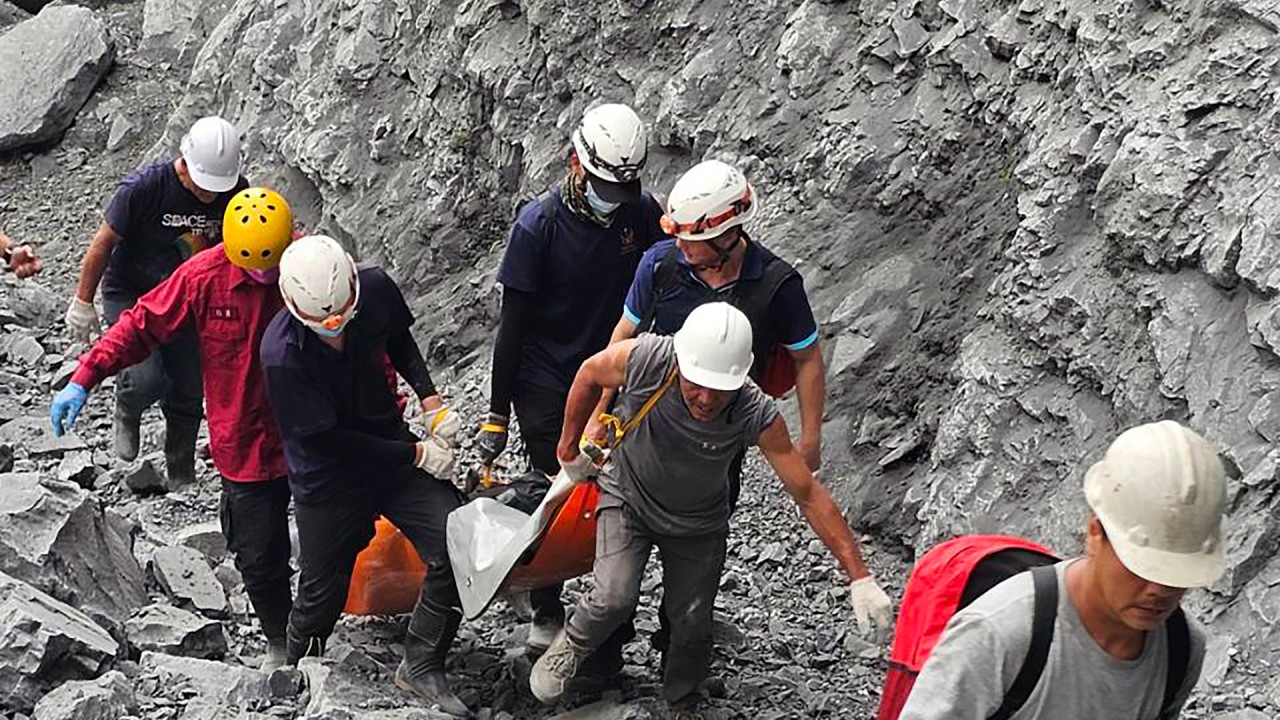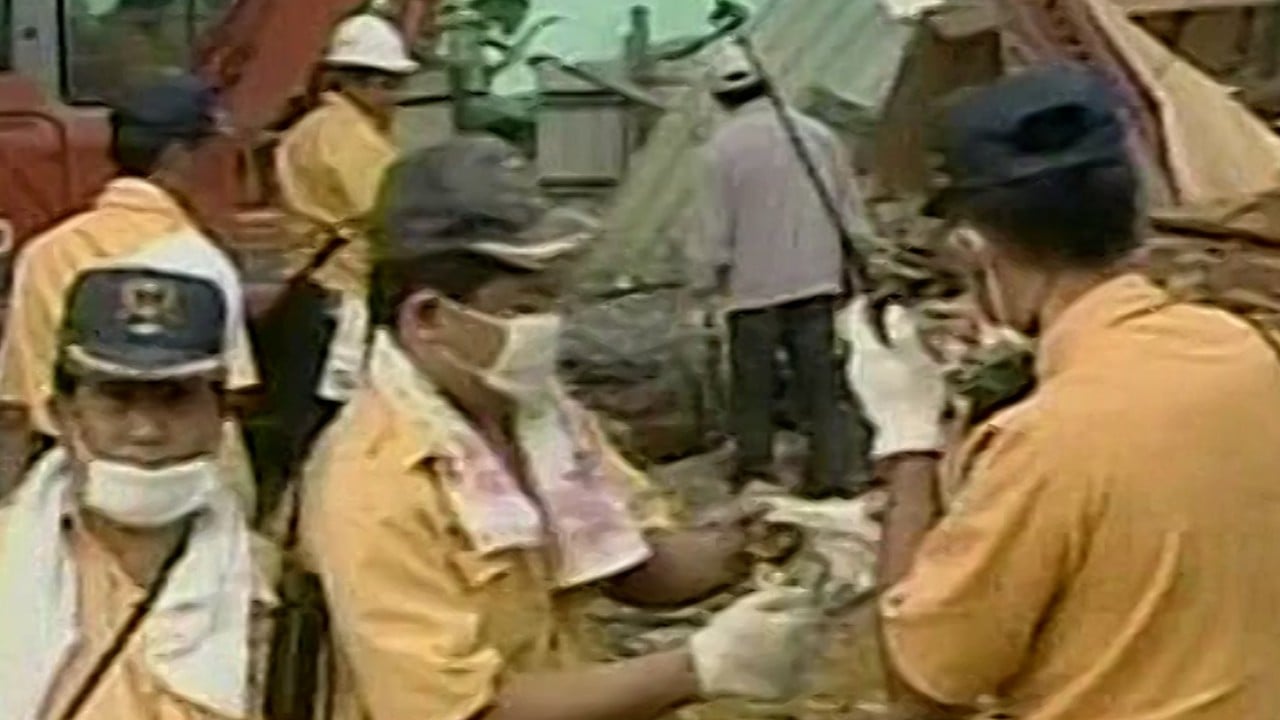
Taiwan earthquake response early test for president-elect William Lai as he tells rescuers to ‘make the most of every minute’
- Lai visited Hualien, the worst affected area, to inspect relief operations after the quake that killed at least nine people and caused extensive damage
- An effective response to the natural disaster could help shore up the president-elect’s ‘weak mandate’ in an opposition stronghold, according to one analyst
At least nine people died after a 7.3 magnitude earthquake struck off Hualien on the island’s east coast on Wednesday morning.
The quake – the strongest to hit the island in a quarter of a century – also injured more than 1,060 people, while 692 remain trapped. It also damaged hundreds of buildings, including two apartment blocks that collapsed in Hualien near the epicentre of the quake.
The quake also slightly damaged six of Taiwan’s F-16 fighters and two F-5Es parked in hangars at Hualien air force base.
The Taiwanese air force said the planes had suffered minor damage and scratches caused by boarding ladders rattling against their fuselage.
“The scratched parts have been promptly repaired and none of the damage will affect the combat readiness and patrol missions of the aircraft,” Taiwan’s air force said in a statement.
Shortly after the quake, Lai, currently vice-president, went to Hualien – the worst hit area – to inspect the rescue operations at sites where serious damage was reported.
Lai, who will take office after President Tsai Ing-wen’s second term ends on May 20, instructed the rescue team to “make most of every minute” to search for people still trapped in a partially collapsed eight-storey building.
“The priority now is to save lives and those rescued must be given the best medical treatment and care as soon as possible,” he said.
Lai also promised to restore power and water outages, repair roads and ensure the central government worked closely with local authorities on relief work.
Analysts said the quake – whose toll was relatively small but which was strong enough to attract international attention – offered a good opportunity for Lai to show that he was effective in dealing with the aftermath of natural disasters.

“It’s a good timing for Lai to demonstrate his capabilities on overall planning for rescue and recovery assistance to affected areas, particularly in Hualien,” said James Yifan Chen, a professor of diplomacy and international relations at Tamkang University in New Taipei.
“In this transitional period, Tsai had better fully authorise Lai [to carry out] earthquake rescue and relief.”
On the other hand, Chen said, the KMT would seize on any failures in disaster relief work to brand Lai’s government as incompetent.
Hsiao represented Hualien county in the legislative yuan between 2016 and 2020, when she lost her bid for re-election. She went on to serve as the island’s de facto ambassador to the United States.
Chen said global leaders including Japanese Prime Minister Fumio Kishida, Indian Prime Minister Narendra Modi, British Foreign Secretary David Cameron and Philippine President Ferdinand Marcos Jnr had all expressed support and concern for Taiwan from a humanitarian perspective.
“However, they may not do the same by sending a high profile delegation to attend Lai’s inauguration because of their respective one-China policies,” he added.
Taiwan earthquake: US, other Taipei allies send messages of support
Most countries, including Japan, India, Britain and the Philippines, do not officially recognise Taiwan as independent, but oppose a forcible change in the status quo. Beijing views the island as part of China and has never renounced the use of force to bring it back under its control.
Huang Huei-hua, a senior researcher with the Taiwan International Strategic Study Society think tank, said the earthquake was a test of Lai’s leadership abilities.
“Compared with the devastating earthquake in 1999, there were no catastrophic losses in Wednesday’s quake billed as the worst in 25 years,” she said, referring to the deaths of around 2,400 people in a magnitude 7.6 quake in 1999.
She said this was because the island had established contingency plans for such disasters, helping central and local governments to coordinate their response as part of Taiwan’s wider “homeland security culture”.
Huang predicted that these mechanisms should ensure that Lai was not faced with a “left-behind mess”.
“Lai is no stranger to serious natural disasters as he had experienced earthquakes, typhoons and other mishaps during his stint as Tainan mayor [between 2010 and 2017],” she added.
“He has accumulated adequate experience to cope with them and Wednesday’s quake will not pose any serious challenge to his upcoming leadership.”
But she said that when Lai takes over as president, he will become commander-in-chief of the armed forces, who play an important role in disaster relief.
“Lai should learn that in addition to building up Taiwan’s defences to cope with enemy threats, he also needs to devise new methods that can help strengthen homeland security and minimise the impact of disasters on his government,” Huang added.
However, relations with mainland China are still expected to be his primary challenge with Beijing expected to ramp up its military and diplomatic pressure on the new president.



